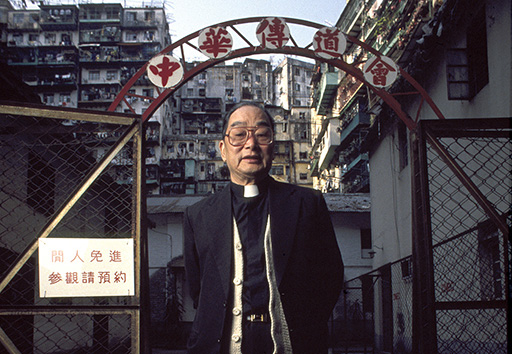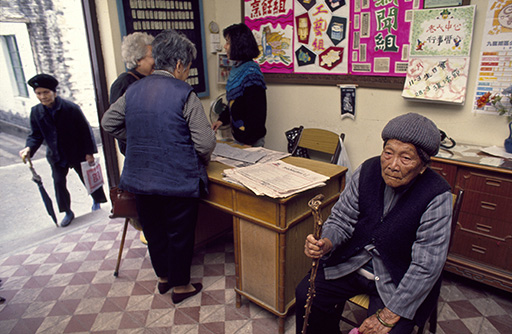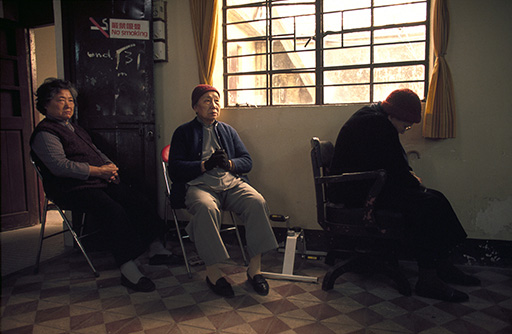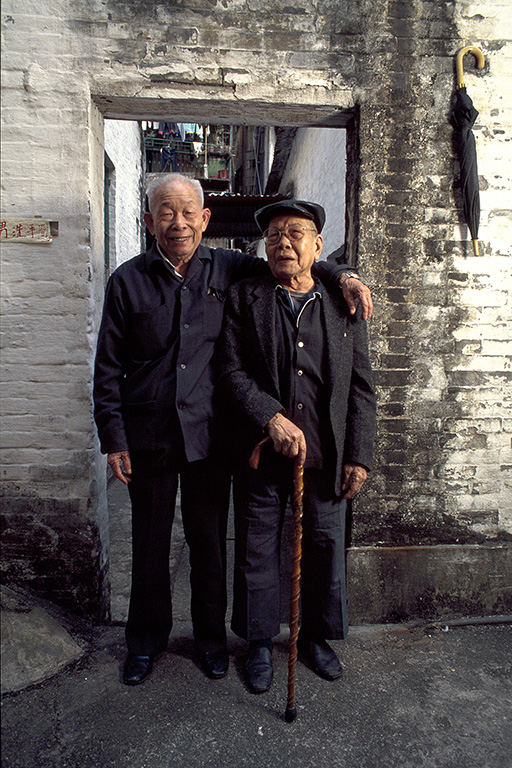CARE FOR THE ELDERLY

The Reverend Isaac Liu became a minister in the CNEC Living Word church in the late 1950s. Running a school, a clinic and a small chapel, he took over the yamen, the old magistrate’s buildings, at the centre of the City in 1971, protecting them from redevelopment over the next 20 years until forced to vacate the premises as part of the clearance in 1991. Originally designated by the HK Government as alms-houses in the 1930s, the yamen was the only building to be saved during the demolition of the City and, though heavily rebuilt, it can now be found in the Kowloon Walled City Park.
“I was born in 1935 and came to Hong Kong in 1950 from my native village in China. I came because of the changes happening there, following the political upheaval of those days. If you did not follow Government policy, there was trouble. Everyone yearned for freedom and many tried to leave the country.
Life was very difficult when I first arrived; only those who had a job could survive. I did not speak Cantonese and I often felt lonely and depressed. But then, one day, I met a stranger in the street, distributing pamphlets. He spoke in Mandarin: “Come and listen to the gospel tonight”. After that I started to go to church often. I learnt some hymns and sang them when I felt lonely and empty. I also read the Bible, and every time I found the feeling of emptiness disappeared.
Within a year of putting my faith in Jesus, I wanted to tell everybody the good message and let them benefit too, but I didn’t know how as I still did not know Cantonese. But then, at one of our meetings, the preacher said they needed someone to help with the preaching. I volunteered and was sent to a seminary where I stayed for three years. It was during my time there that I began to work in the Walled City. To begin with, we rented a few wooden shacks and started a school for the children – mainly reading and writing.
Then, in 1960, we started a Gospel Centre, in a four-storey building on Lung Shing Road. On the ground floor we had a chapel – with a small clinic and rehabilitation centre for drug addicts on the mezzanine floor above – and on the three floors above we started the Tak Shing school. At our peak we had more than 420 pupils, from kindergarten to primary Six. We taught the same subjects as other schools and most of our pupils came from the Walled City.
In 1971 we moved to our present premises, which were previously a home for the elderly, in the centre of the City. We continued to operate the school, chapel and clinic, but after a while the doctor moved to Yau Tong; he was upset because the drug addicts he helped kept going back on the habit. The Salvation Army took over his premises for a few years.
We started the Old People’s Centre in 1979. At first we had very little money. We opened in the afternoons from Monday to Saturday, and on Sunday for worship. We applied for Government grants and when we received some support we started to organise more activities. We distributed pamphlets in the Walled City, but people didn’t believe we could offer so many activities for free. Only a few people came to begin with but, as they spread the word, numbers grew. Now we have 184 members.
The Government has offered us a new place in Kwun Tong of about 1600 square feet, but our premises here are three times that size. Only about a third of the elderly have moved out of the Walled City so far. We are arranging for them to join other centres near their new homes, and we will continue to serve the aged in our new district. Some of the elderly who have moved out wanted to travel back each day to the Centre, but we told them it was too dangerous. They complained that we didn’t want them any more, but we said that was untrue and that we were thinking of their safety. They wanted to come back because of the close relationships they had established here and because of the many benefits we offer.
We provide afternoon tea including biscuits. The Social Welfare Department doesn’t like this as it fears it will encourage some people not to eat lunch. I explained that the elderly want to save money for their children in China and we were just giving them a little help, so the service has been maintained. When we move to our new premises we will not have a kitchen, only a pantry, but I suppose the needs of the residents there may be different.
A few years ago we could only raise about $10,000 each year for our activities’ fund. Now, however, we receive an annual donation of $30,000 from the Community Chest and other funds from the church. This means we can now pay a salary to the two women who used to help us voluntarily. They are both mothers, but they work very hard and have never taken long periods of leave. And, since last year, we have also employed a supervisor, paid for separately by the Community Chest.
We arrange trips which are always popular. Each time we have around 90 participants and need to hire three coaches. The two mothers and I lead the trips, and we have at last one trip or major activity each season..
I began living in the Walled City in 1971. I was not afraid as I had been visiting frequently since the mid-1950s. In the ‘60s there were many drug addicts – you could always see them from the roof of the school – and there were also gambling spots, vice establishments and live shows but these disappeared slowly during the ‘70s. We were not disturbed, as they knew we were operating for the welfare of the residents.
Some of our members are very active, others are quiet and some are difficult to handle. Most are fairly independent and come and go as they please, but some worry that if they don’t come to the Centre every day we will have to close down. You have to have more patience when handling the elderly; you can scold a child, but not an old person.


